 From time to time, this blog looks at something about writing, which can sometimes be as much of a spiritual practice as meditation or prayer or labyrinth-walking.
From time to time, this blog looks at something about writing, which can sometimes be as much of a spiritual practice as meditation or prayer or labyrinth-walking.
Writing, though, is usually more intentional than many other spiritual practices. Part of the intentionality is how deliberate the writer must be about word choice and image choice.
Just in case you don’t believe that, here is a short and somewhat playful demonstration:
“Her face reddened” means one thing. (Has she been caught in a lie?)
“Her eyes reddened” means something altogether different. (Is she sad, or about to cry?)
“Her hair reddened” is a whole other thing. (Only her hair dresser knows for sure.) And “her ears reddened” is another shift in meaning. (Likely embarrassed about something — or possibly just caught out in the cold without earmuffs.) Yet, all of these are about redness occurring on the head.
We also talk about “red-handed,” which means something different from “her hands were red.” And a business might be “in the red” but might be saved by a “red-letter day.”
The English language offers so much meaning, often layers of it. It is a gift to find a writer who knows the depth of what’s possible with our language and how to employ it artfully.




 Today is an unexpected day off in the middle of a week-long fence-repair project. My contractor has pruned all the plants in the flower beds on the sides of the fence and covered them with painters plastic. She has replaced a rotten board or two and used a strong cleaning product along with a brush to remove algae. Through the process, the boards got a good soaking. She asked me to check the bottoms of the boards this morning to make sure they were dry enough for paint.
Today is an unexpected day off in the middle of a week-long fence-repair project. My contractor has pruned all the plants in the flower beds on the sides of the fence and covered them with painters plastic. She has replaced a rotten board or two and used a strong cleaning product along with a brush to remove algae. Through the process, the boards got a good soaking. She asked me to check the bottoms of the boards this morning to make sure they were dry enough for paint.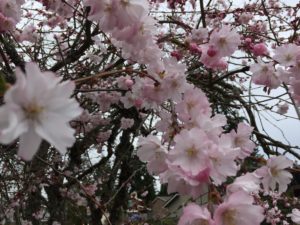 You could almost say that faith is a gift that keeps on giving. That is, no matter how many times I visit the issue of faith, there comes another time when the subject deserves another look. It’s a very big subject.
You could almost say that faith is a gift that keeps on giving. That is, no matter how many times I visit the issue of faith, there comes another time when the subject deserves another look. It’s a very big subject.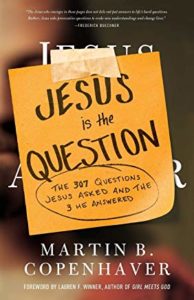 What prompts my latest reconsideration of this vast subject of faith is the book my Sunday study group has been reading: Jesus Is the Question: The 307 Questions Jesus Asked and the 3 He Answered, by Martin B. Copenhaver. A few weeks ago, the group took up Chapter 4: “Questions about Faith and Doubt.” In those pages was a quote by William Sloane Coffin: “Faith isn’t believing without proof—it’s trusting without reservation.” [Coffin was a former Yale University chaplain who was instrumental in creating the Peace Corps.]
What prompts my latest reconsideration of this vast subject of faith is the book my Sunday study group has been reading: Jesus Is the Question: The 307 Questions Jesus Asked and the 3 He Answered, by Martin B. Copenhaver. A few weeks ago, the group took up Chapter 4: “Questions about Faith and Doubt.” In those pages was a quote by William Sloane Coffin: “Faith isn’t believing without proof—it’s trusting without reservation.” [Coffin was a former Yale University chaplain who was instrumental in creating the Peace Corps.] This is a picture of one of my dogs taken a few days ago during the extraordinary snowstorms that came to the Pacific Northwest. Admittedly, our storms were not comparable to those that have repeatedly hit the eastern portion of the United States in recent years, but for us, with our ill-equipped municipalities and our never-ending hills, the snow accumulations were traumatic.
This is a picture of one of my dogs taken a few days ago during the extraordinary snowstorms that came to the Pacific Northwest. Admittedly, our storms were not comparable to those that have repeatedly hit the eastern portion of the United States in recent years, but for us, with our ill-equipped municipalities and our never-ending hills, the snow accumulations were traumatic.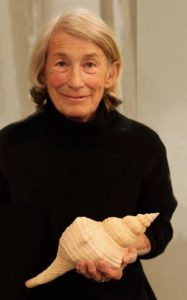 I was saddened to see the announcement yesterday of the passing of Mary Oliver, longtime favorite poet of mine and of many others in my circles. What an extraordinary woman and writer! I first fell in love with her over her poem “The Summer Day,” which asks big questions like “Who made the world?” and states big thoughts like “I don’t know exactly what a prayer is,” then devotes the heart of the poem to a grasshopper she has happened to meet. That’s the poem that ends with her famous question: “Tell me, what is it you plan to do with your one wild and precious life?”
I was saddened to see the announcement yesterday of the passing of Mary Oliver, longtime favorite poet of mine and of many others in my circles. What an extraordinary woman and writer! I first fell in love with her over her poem “The Summer Day,” which asks big questions like “Who made the world?” and states big thoughts like “I don’t know exactly what a prayer is,” then devotes the heart of the poem to a grasshopper she has happened to meet. That’s the poem that ends with her famous question: “Tell me, what is it you plan to do with your one wild and precious life?” This morning I read a reflection by Henri J.M. Nouwen, the widely read priest and author noted for his work with the poor and disabled. Entitled The Spiritual Work of Gratitude, the reflection ended with this prayer: Lord, cultivate within me a spirit of gratitude for all you’ve given and all you’ve taken away. Blessed be your name, Lord. Amen.
This morning I read a reflection by Henri J.M. Nouwen, the widely read priest and author noted for his work with the poor and disabled. Entitled The Spiritual Work of Gratitude, the reflection ended with this prayer: Lord, cultivate within me a spirit of gratitude for all you’ve given and all you’ve taken away. Blessed be your name, Lord. Amen.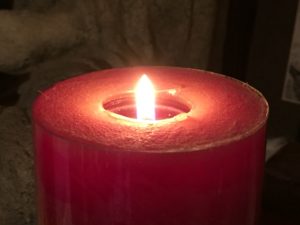 It’s December 2nd. Tonight at sundown the Jewish festival of Hanukkah begins.
It’s December 2nd. Tonight at sundown the Jewish festival of Hanukkah begins.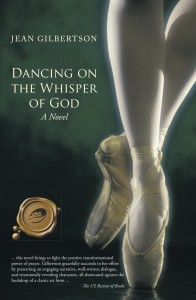 These days, getting the mail is not usually something I celebrate. This week, however, I received an unexpected magazine in the mail that gave me real joy.
These days, getting the mail is not usually something I celebrate. This week, however, I received an unexpected magazine in the mail that gave me real joy.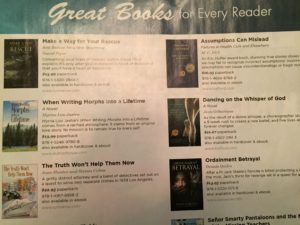
 My niece recently posted on Facebook something called “The Other Serenity Prayer.” Most of us know by heart the standard Serenity Prayer, which goes: “God, grant me the serenity to accept the things I cannot change, the courage to change the things I can, and the wisdom to know the difference.”
My niece recently posted on Facebook something called “The Other Serenity Prayer.” Most of us know by heart the standard Serenity Prayer, which goes: “God, grant me the serenity to accept the things I cannot change, the courage to change the things I can, and the wisdom to know the difference.”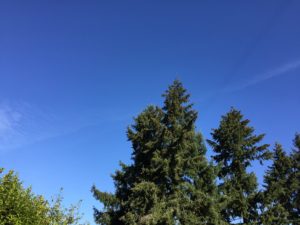 My friend Mary reminded me of that old song that includes the line that the bluest skies you’ll ever see are in Seattle. These October days show clearly why someone might have that thought. It is rare for Seattle to have such a string of beautiful, clear, vivid days like we have been having.
My friend Mary reminded me of that old song that includes the line that the bluest skies you’ll ever see are in Seattle. These October days show clearly why someone might have that thought. It is rare for Seattle to have such a string of beautiful, clear, vivid days like we have been having.